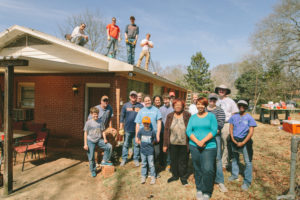written by Matt Dean
As we continue through our survey of the book of Nehemiah, we pick up in chapter 6:16, “all of the surrounding nations were afraid and lost their self-confidence because they realized that this work is been done with the help of our God.” In 52 days, the wall was rebuilt. Nehemiah’s clear vision for the future… all of his planning… all of the details… and the way he carried out the clear responsibility to rebuild the wall stands
as a testimony of what God can do through ordinary people.
Nehemiah positions people for the preservation and safety of Jerusalem. It wasn’t merely a construction project, but one of restoration of God’s people.
We find that Nehemiah’s top qualifiers for senior leadership were integrity of heart and respect for God. More than volunteers, Nehemiah needed the right people with the right character for specific responsibilities.
After the wall had been rebuilt and I had set the doors in place, the gatekeepers and the singers and the Levites were appointed. I put in charge of Jerusalem my brother Hanani, along with Hananiah the commander of the citadel, because he was a man of integrity and feared God more than most men do.(Nehemiah 7:1-2 NIV)
As we prepare our hearts for My Jerusalem, may the same be true of us; that we demonstrate integrity of heart and reverence for God. Herein lies the better motivation for serving others — our desire to help others has to be rooted in an upright heart and reverence for God. We don’t want to serve in the community just to do something good, but we serve in the community because of reverence for God. We reach out in Jesus’ name because His name is worthy to be known by all of our neighbors.
Building the city meant protecting its new residents.
I said to them, “The gates of Jerusalem are not to be opened until the sun is hot. While the gatekeepers are still on duty, have them shut the doors and bar them. Also appoint residents of Jerusalem as guards, some at their posts and some near their own houses.” (Nehemiah 7:3 NIV)
Nehemiah understood that the wall was built to contain and cultivate life within Jerusalem, but few people were there, and a record of residents was needed to preserve history.
“Now the city was large and spacious, but there were few people in it, and the houses had not yet been rebuilt. So my God put it into my heart to assemble the nobles, the officials and the common people for registration by families. I found the genealogical record of those who had been the first to return.” (Nehemiah 7:4-5 NIV)
Nehemiah 7:6-72 is the genealogical account and history of those who had returned to Jerusalem and Judah after captivity in Babylon. The very specific lists of men and women, servants and singers, gatekeepers and priests, with every name and number — reminds us that God loves people, but that every person matters to God. Every face. Every name. Every story.
This year at My Jerusalem we are asking God to work in a similar way through us. We are ordinary people with a clear plan and specific burden to see the practical needs of people being met through God’s people.
We are asking for eyes to see people, one person at a time.
Our goal is to meet the practical needs of our neighbors in this community, but the needs will always be ongoing. Such is life in a broken world. The work of meeting the practical needs of people is never ending.
But the most important burden we have is to announce the news of God’s love for us in Jesus Christ.
Father, help us bear the burdens of the needs of people with the confidence of your strength and character, with the assurance of what hope looks like when we reach out to serve others’ in the name of Jesus.








